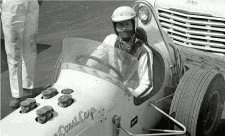Archive for Opinion
Support Your Local Short Track in 2009
Posted by: | CommentsWith Spring rapidly approaching it won't be long until our local short tracks begin opening up for their regular weekly racing programs. Now would be a good time to check the schedules of nearby tracks and commit ourselves to attending several events in our area for the coming year.
Living in New Jersey, I've become quite familiar with seeing race tracks close their gates. And when they do, it's almost always forever. With the economic forecasts looking rather bleak, now is the time more than ever to support our local tracks if we expect to sustain grassroots racing.
What can we do to support short track racing? There are two things in particular that I think will be most important this season.
The first is obvious: patronize our tracks. If we don't show up and make it profitable for owners to run these events, they're going to close up and move on to something else. Another thing to consider is that for the price of a typical NASCAR Sprint Cup ticket, one can instead attend four or five local short track races. Not only that, but the food is cheaper, the action is much closer, the grandstands are more comfortable, and chances are the races will be more exciting. If that isn't motivating enough to ditch our Cup tickets, think about it this way: the less money we spend on NASCAR, the less money that ends up in Kyle Busch's wallet. (Yeah... I knew that would clinch it.)
The second point is just as important: we have to be more willing to express to track operators -- in constructive ways -- what we like and what we don't like. If there's a particular show or event we enjoyed, we should tell them. If there was something that we didn't think was so great, let them know that too. Having a pulse on what the fans want is pivotal to making good business decisions.
The tracks that understand that their primary customer is the racing fan, and work to expand their customer base by attracting fans (both hardcore and casual) based on their preferences, will, in my view, be more likely to weather the coming economic storm.
So dust off the blankets and goggles and let's get ready for a fun year of racing in 2009.
What Happened to Normal Race Distances?
Posted by: | CommentsI got a little queasy when I learned that this weekend's NASCAR Sprint Cup race at Las Vegas is called the "Shelby 427". As in... "427 miles". You've got to be kidding me. Apparently Carroll Shelby's company is sponsoring the race, whose distance now honors his 427 Cobra.
Now I understand the importance of sponsorship in motorsports, and enthusiastic sponsors are great, but hasn't it gotten a bit out of hand lately? We're changing race distances to match sponsor promotions? Like the Aaron's 312. Instead of 300 miles, it's 312 to help promote the sponsor's slogan. Same with the Aaron's 499 (though the race actually remains 500 miles).
When race distances are changed on a whim to meet sponsor slogans I really think it's time to take a step back, take a deep breath, and ask ourselves if integrity should be permitted to play any role in this sport at all.
Fans already feel like they're being fed a four-hour commercial. Enough is enough, let us have some stability... for a change.
Reunification: Much Hype, Little Results
Posted by: | CommentsWatching the travails of the Indy Car Series over the past decade has definitely left me scratching my head on more than one occasion. Last year the hype was over "reunification" -- the agreement that finally brought the Indy Racing League and Champ Car World Series back together. Robin Miller was consistently talking about its necessity on Dave Despain's TV show. But to what end?
As much as the IRL had struggled in recent years, I couldn't really see what Champ Car brought to the table, except maybe a couple of teams to help fill out fields. I don't think Champ Car racing (or the IRL for that matter) is particularly attractive to the average American race fan.
So here it is, 2009, everyone's back together, and what do we have? Very little difference in my estimation. And by that I mean the obvious: very little interest from most racing fans with very little opportunity for growth.
That, I think, is the key. I have seen some very close finishes in recent IRL oval races -- three-wide for the win and the like. But, to be honest, even they never really generated much excitement in me. It's hard to be excited about a series where the drivers have almost no fan base. And contriving a false "Danica-Mania!" isn't going to cut it.
There is a lot of talk in Indy Car circles about sponsors and teams and car owners and venues... but I've seen very little focus on finding ways to generate enthusiasm amongst fans, sans maybe a couple of ill-fated advertising campaigns ("I am INDY", anyone?). What we have seems to be a series that has relegated itself to "club" status -- racing for each others' money and that's about it.
With the growing number of entertainment options available today, it's hard to see how the Indianapolis 500 is going to survive this poor leadership long into the future.
Kevin Harvick: “Don’t Watch NASCAR”
Posted by: | CommentsWell okay, that's not quite how he worded it. But his solution for those fans who don't like restrictor plate "racing" isn't drastically different:
Tell them to watch something else. If they don't like it, they don't have to turn the TV on. That is the way I look at it. I thought [Saturday's Budweiser Shootout] was pretty exciting. I think [such fans] are going to complain just to complain sometimes. It was an exciting race from start to finish. I have a hard time with people like that.
Okay, I'll give it up for the Shootout: there were a handful of pretty sweet passes including Harvick's move that earned him the win, but on the other hand, the thing was a crash-fest. And, yet again, we had a crash that ended the race under caution.
This is rather symptomatic of restrictor plate racing. The field is bunched up in huge packs lap after lap and the "passing" is dictated by who happens to be in the right lane and gets the necessary aerodynamic push to make a pass happen. The excitement doesn't come from one driver overtaking another, since they're all running side-by-side and often three-wide for several rows. The excitement is generated merely by the tension of knowing that they're inches away from having a big wreck. A big wreck that inevitably happens.
The end of the race tends to be the most difficult to watch. As a fan, you're eager for the race to get into a rhythm for a run down to the finish. Instead, you end up seeing impatient drivers causing one caution after another after another until the race is finally completed. And oftentimes the winner was the guy who just happened to be out in front when the final yellow came out (see: 2009 Daytona 500 and Budweiser Shootout).
Of course it's hard to know the full context of Harvick's comments from such a short blurb. However, in fairness to fans, the majority of complaining that NASCAR has responded to in the past 5-10 years has been that raised by the drivers, car owners, sponsors and media types. The fans have been largely ignored.
When fans have legitimate gripes, I'm not sure that the best response is, "If you don't like it, don't watch." I have been hearing that retort for many years now. And based on recent attendance and television rating trends, it appears that advice is being taken. I don't think that having a disgruntled fan base is a good move for the sport. The fans are the customers and ultimately they're more important to Harvick's success as a race car driver than the patches on his uniform.
Top 35: Let’s Pass on This Mess
Posted by: | CommentsMark me down as an unbeliever of NASCAR's rule that guarantees starting positions for the top 35 car owners in championship points. It unnecessarily adds confusion, de-emphasizes the importance of qualifying, and really hurts the less-funded teams, especially when they post relatively fast times in qualifications. The rule places smaller teams at an even larger disadvantage and all the more draws out the disparity between them and the top teams.
Now don't get me wrong, I'm a big supporter of provisional starting positions. I understand their need and why we have them. Fans pay good money for tickets far in advance and they expect to see the top drivers racing when they show up at the track. You can't have a situation where a popular driver like Dale Earnhardt Jr. spins out on his qualifying lap and misses the show because of it. I also think it's appropriate to reward teams who race on the tour consistently and by doing so help to advance the sport. And this is why I believe that a handful of provisionals makes sense.
But there's quite a big difference between having 35 qualifiers with a handful of provisionals and having 35 provisionals with a handful of qualifiers. It just seems to mock the integrity of the sport. Not to mention how sick I am of hearing about the "top 35" week in and week out: who's in it and who's not. And now we have to deal with all the controversies of car owners "buying points" from other car owners so that their teams are guaranteed a starting spot in the first few races of the season. NASCAR has gone so far as to ban all track testing in an effort to constrain costs, while at the same time we have teams essentially buying their way into races.
Personally, I like the system they had in the early 90s. They would have a first round of qualifying where the top 20 or so were locked in based on time. Then, on the following day, they would have a second round of qualifying where drivers could choose to either stand on their first round times, or make another qualification attempt. This gave drivers who flubbed their first attempts because of a wreck, bad setup, or whatever a second chance. Finally, a small set of provisionals was handed out to those high enough in points who, for whatever reasons, weren't fast enough to make it in through qualifications.
Considering the amount of money sponsors put up to fund these teams, and the amount of money owners are spending to run them, I think it's unlikely we'll see this top-35 rule rescinded any time soon. But I'll admit that sometimes it feels good pretending that the fans' opinions matter. Maybe with sluggish ticket sales their opinions will matter a little more in the future.

